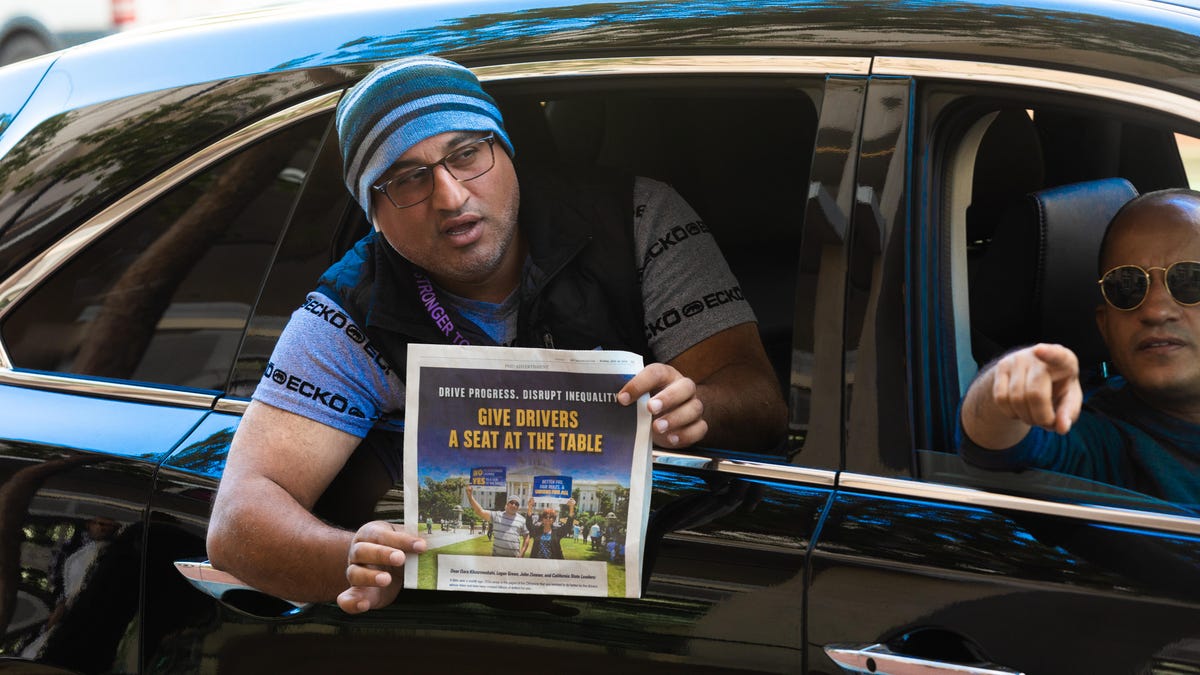California governor signs gig-worker bill that could upend Uber, Lyft as we know them
"The need to create lasting economic security for our workforce demands action, " Gov. Gavin Newsom says. "Assembly Bill 5 is an important step."

Ride-hail drivers held several protests in front of Uber's San Francisco headquarters over the past few months.
It's official, the gig economy is about to undergo a major shakeup in California. Gov. Gavin Newsom signed a landmark bill, AB 5, into law on Wednesday, which could require companies that use independent contractors to reclassify their workers as employees. Such companies include ride-hailing services, like Uber and Lyft, and delivery startups, such as DoorDash and Postmates.
"The hollowing out of our middle-class has been 40 years in the making, and the need to create lasting economic security for our workforce demands action," Newsom said in a statement. "Assembly Bill 5 is an important step."
Uber and Lyft drivers are currently classified as independent contractors, sometimes referred to as gig-workers, which means they don't get benefits including Social Security, health insurance, paid sick days and overtime. Many drivers say this system has led to exploitation. They say they've seen lower pay, higher costs and longer working hours as the cost of living has risen over the years.
Under AB 5, all companies using independent contractors in the state will be put to a three-part test that looks at how much control the company has over its workers. If the companies don't pass the test, they may be required to classify their workers as employees. That means those workers will get access to labor rights, such as minimum wage, unemployment insurance, workers' compensation and the ability to join a union.
"For workers like us, who have no basic pay or protections AB 5 becoming law is an historic victory," said California ride-hail driver Mike Robinson.
Uber and Lyft have both said their business models hinge on drivers staying independent contractors. When Uber filed to become a publicly traded company with the Securities and Exchange Commission in April, it said, "Our business would be adversely affected if drivers were classified as employees instead of independent contractors." One of the reasons for this is because the companies will likely experience a sharp uptick in costs.
Before AB 5 passed, both Uber and Lyft sent messages to all California drivers saying that if they're classified as employees, they could lose their flexible work schedules. They also sent petitions to riders warning of less dependable rides. The two companies additionally tried to strike a deal with lawmakers on the bill, but to no avail.
"We've engaged in good faith with the Legislature, the Newsom administration and labor leaders for nearly a year on this issue," an Uber spokesman said in an email. "We believe California is missing a real opportunity to lead the nation by improving the quality, security and dignity of independent work."
Advocates for AB 5 say many companies that rely on independent contractors are unfairly shifting business costs onto their workers. Additionally, advocates say, when contractors get sick or injured on the job, taxpayers tend to bear the cost of supporting them. California's Division of Labor estimates that the misclassification of workers adds up to a loss of $7 billion per year in estimated annual payroll tax revenue.
Other states are also looking at gig worker classification. Washington and Oregon have considered legislation similar to AB 5. Assemblywoman Lorena Gonzalez, a Democrat from Southern San Diego County, sponsored the bill and said AB 5 could stand as an example for other lawmakers to look toward.
"We are disrupting the status quo and taking a bold step forward to rebuild our middle class and reshape the future of workers as we know it," Gonzalez said in a statement. "As one of the strongest economies in the world, California is now setting the global standard for worker protections for other states and countries to follow."
While AB 5 is scheduled to go into effect on Jan. 1, 2020, the battle in California might not yet be over. Uber said last week that it believes it will be able to pass AB 5's three-part test and therefore won't have to reclassify its workers.
"Just because the test is hard doesn't mean that we will not be able to pass it," Tony West, Uber's chief legal officer, said during a press call. "We continue to believe drivers are properly classified as independent ... drivers will not be automatically reclassified as employees, even after January of next year."
Both Uber and Lyft have also said they're ready to take the issue to California voters by sponsoring a ballot initiative in November 2020 that would exempt them from the law. Along with DoorDash, Uber and Lyft have already transferred $30 million each into a campaign committee account to sponsor the initiative.
Despite those actions, gig workers say they're not going to give up easy.
"We are laser-focused on growing our movement to make sure AB5 is implemented and enforced to give us the change we need," said the ride-hail driver Robinson. "Across the golden state we will continue to push for the state, cities, and labor to work together to hold these billion-dollar bullies accountable, and to deliver gig workers the same protections afforded to other workers in California."
Lyft didn't return request for comment.
Originally published Sept. 18, 1:07 p.m. PT.
Update, 2:22 p.m.: Adds additional background information and comments from Uber spokesman, Assemblywoman Lorena Gonzalez and ride-hail driver Mike Robinson.

